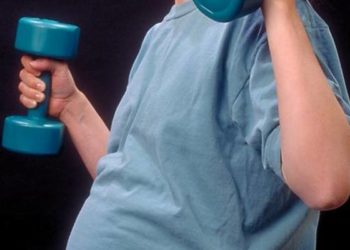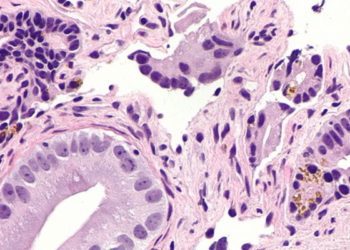2 Minute Medicine Rewind November 19, 2018
After acute hospitalization, elderly patients are often unable to recover to their preadmission functional status. This single-center randomized controlled trial aimed to investigate the effects of an exercise intervention initiated during hospitalization in terms of its effects on patients’ functional capacity. Acutely hospitalized patients (n=370) with a median age of 87.3 years were randomized to receive usual hospital care or an intervention that included twice-daily moderate intensity balance, walking, and resistance exercises. Functional capacity was assessed at baseline and at discharge using the Barthel Index of Independence and the Short Physical Performance Battery (SPPB). As compared to the usual care group, patients in the intervention arm had a significantly higher mean Barthel Index score (difference 2.2 points, 95% CI 1.7 to 2.6 points) and mean SPPB score (difference 6.9 points, 95% CI 4.4 to 9.5 points) on discharge. Significant benefits in cognitive status were also seen with this intervention. Investigators therefore concluded that, in very elderly patients, an exercise intervention during acute hospitalization may significantly improve functional and cognitive status at discharge as compared to usual care.
With a rise in the incidence of human papillomavirus (HPV) infection, there has been a rapid increase in the incidence of oropharyngeal squamous cell carcinoma (SCC). Cisplatin-based chemoradiotherapy and cetuximab bioradiotherapy are approved treatment modalities in the management of oropharyngeal SCC, with cisplatin being the standard of care in advanced disease. However, cisplatin therapy is associated with significant toxicity as compared to radiotherapy alone. There has recently been increased discussion surrounding the use of cetuximab, a monoclonal antibody and epidermal growth factor receptor inhibitor, as an alternate radiosensitizer. In this randomized controlled trial, 334 patients were randomized to receive cisplatin or intravenous cetuximab in addition to radiotherapy to compare the toxicity, survival and time-to-recurrence outcomes of cetuximab versus cisplatin in patients with low-risk, HPV-positive oropharyngeal SCC receiving radiotherapy. Researchers found that after 24 months the incidence of severe toxicities (grades 3-5) was not significantly different between the treatment groups, with a mean of 4.8 events per patient (95% CI 4.2 to 5.4) noted in both the cisplatin and cetuximab groups (p=0.98). However, cisplatin therapy resulted in significantly improved overall survival at 2 years, with 97.5% survival as compared to 89.4% in the group treated with cetuximab (HR 5.0, 95% CI 1.7 to 14.7, p=0.001). Recurrence rate was also significantly lower in the group treated with cisplatin. Investigators therefore concluded that there was no significant difference between the treatment regimens in terms of severe toxicity, but that cetuximab therapy did result in a significantly lower survival rate at 2 years, as well as a significantly increased recurrence rate, when compared to the treatment regimen involving cisplatin.
Black individuals have a higher proportion of increased electrocardiographic voltage and concentric left ventricular hypertrophy (LVH), as compared to white individuals. However, self-identified individuals in the United States have both African and European ancestry. In this probability-based cohort study with purposeful oversampling of self-identified black individuals in the Dallas County, Texas, investigators aimed to determine whether genetically determined African ancestry impacts the prevalence of increased electrocardiographic voltage or LVH. Participants (n=2077) underwent an electrocardiogram and cardiac magnetic resonance imaging (CMR). Both electrocardiographic voltage and markers of concentric LVH on CMR were assessed. After adjusting for several factors, including age, sex, and blood pressure, with both Black race and African ancestry entered in the same model, researchers found that African ancestry was associated with all CMR markers of LVH, including left ventricular concentricity (p=0.03), left ventricular wall thickness (p=0.03), prevalent LVH (p=0.04), and increased electrocardiographic voltage (p<0.001 for 12-lead voltage). However, in that same model, Black race was not associated with elevated electrocardiographic voltage (p=0.89 for 12-lead voltage), wall thickness (p=0.38), left ventricular concentricity (p=0.25), or prevalent LVH (p=0.55). Investigators therefore concluded that African ancestry was associated with increased electrocardiographic voltage and CMR markers of LVH, suggesting there is a genetic basis to the observed increased prevalence of these phenotypes in Black individuals.
Neural hyperactivity in the hippocampus has been shown to play a role in psychosis, as it has been thought to lead to an increase in subcortical dopamine via glutamatergic projections to the striatum. This cross-sectional study aimed to investigate the association between hippocampal glutamate levels in individuals at clinical high risk for psychosis, and their subsequent clinical outcomes. Patients at high risk for psychosis met 1 or more of the following criteria: (1) attenuated psychotic symptoms; (2) brief,
limited intermittent psychotic symptoms (a history of 1 or more episodes of frank psychotic symptoms that resolved spontaneously within 1 week in the past year); or (3) a recent decline in function, together with either the presence of schizotypal personality disorder or a family history of psychosis in a first-degree relative. As part of the study, high-risk individuals (n=86) and healthy controls (n=30) underwent 3-T proton magnetic resonance spectroscopy to measure concentrations of glutamate in the left hippocampus. At a median follow-up of 18.5 months, patients were assessed for transition to psychosis using the Comprehensive Assessment of the At-Risk Mental State. Overall functioning was also assessed using the Global Assessment of Function (GAF) scale. Researchers found that high-risk individuals who became psychotic had significantly higher baseline glutamate levels, as compared to high-risk individuals who did not become psychotic (p=0.048). These patients also had higher levels of creatine (p=0.01) and myo-inositol (p=0.002) compared with clinically high-risk individuals who did not become psychotic. Additionally, significantly higher hippocampal glutamate levels in high-risk patients were associated with poor functional outcomes, as determined by a GAF<65 (8.83 vs. 7.76, p=0.02). In a logistic regression, hippocampal glutamate levels were significantly associated with transition and non-transition to psychosis (OR 1.61, 95% CI, 1.00 to 2.59; p=0.05) and overall functioning (OR 1.71, 95% CI 1.10 to 2.66, p=0.02). Investigators therefore concluded that, in patients at high risk for psychosis, higher baseline hippocampal glutamate levels are associated with both transition to psychosis and poor functional outcomes.
Several treatment regimens are available for prostate cancer with a Gleason score of 9 or 10. These include radical prostatectomy (RP) with adjuvant external beam radiation therapy (EBRT), androgen deprivation therapy (ADT), or both (MaxRP), as well as a regimen without surgery that includes EBRT, ADT, and brachytherapy (MaxRT). In this cohort study, MaxRP was compared to MaxRT to compare prostate cancer-specific mortality in patients with Gleason 9 or 10, T1-4N0M0 prostate cancer (n=130). Researchers found that at a median follow-up of 5.51 years in the MaxRT group and 4.78 years in the group that underwent surgery, there was no significant difference in prostate-cancer specific mortality (HR 1.33, 95% CI 0.49 to 3.64, p=0.58) when comparing MaxRP and MaxRT, yielding a plausibility index for equivalence of 76.75%. There was also no significant difference between MaxRP and MaxRT in terms of all-cause mortality (HR 0.80, 95% CI 0.36 to 1.81, p=0.60), corresponding to a plausibility index of 77.97%. Investigators therefore concluded that it is plausible MaxRP and MaxRT regimens lead to equivalent risk of prostate cancer-specific and all-cause mortality in patients with a Gleason score of 9 or 10.
Image: PD
©2018 2 Minute Medicine, Inc. All rights reserved. No works may be reproduced without expressed written consent from 2 Minute Medicine, Inc. Inquire about licensing here. No article should be construed as medical advice and is not intended as such by the authors or by 2 Minute Medicine, Inc.







